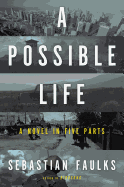
| Publisher: | Henry Holt | |
| Genre: | Fiction, Literary | |
| ISBN: | 9780805097306 | |
| Pub Date: | December 2012 | |
| Price: | $25 |
| Starred | Fiction |
by Sebastian Faulks
Sebastian Faulks's A Possible Life is five loosely connected stories, in which connection--however fleeting--is the point.
Geoffrey, a British schoolteacher taken prisoner in Poland during World War II, keeps his frightening reality at bay by imagining himself on a sunny English cricket pitch. When he is forced to shovel half-cremated bodies of babies, all such images disappear forever. His betrayal by the woman he loves adds to his despair. Putting his life back together begins with a simple act of kindness from a former student.
Billy is sent to the workhouse when he is seven years old in 1859 England. He marries a woman who is subsequently institutionalized, and her sister becomes a "wife" to him. They bear their impossibly difficult lives with dignity, taking solace in each other.
Elena's story forms the centerpiece of the book. She is an Italian scientist in 2029 who discovers that "the defining quality of human consciousness... was not an entity, but a connection... a voluntary self-awareness allowing its possessors to infer thought processes in others."
Jeanne, an ignorant peasant girl in 1822 France, is read to from the Bible by her Master, and comes to understand parables that help her cope with her life. Finally, Anya is a Joan Baez type--a girl with a guitar and a stunning voice--in 1970s New York. She connects only with those things that give meaning to her life so she can turn them into songs.
These five tales are provocative meditations on love, loss, evil and what it means to be human, beautifully rendered by a prose master. --Valerie Ryan, Cannon Beach Book Company, Ore.
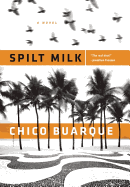
| Publisher: | Grove Press | |
| Genre: | Fiction, Literary | |
| ISBN: | 9780802120083 | |
| Pub Date: | December 2012 | |
| Price: | $23 |
| Fiction |
by Chico Buarque, trans. by Alison Entrekin
Eulálio Assumpção, 100 years old, is trying to tell the story of his life. Time has reduced him to a complaining old man in a hospital bed. His addled babbling is directed at someone--but who? Maybe he's mistaking his daughter for his wife, who either ran off or was killed in a car accident or drowned or died of tuberculosis. His past is a patchwork of lies. His memory is failing. And his morphine medication is making him loopy, pushing the convention of the unreliable narrator into a whole new delirious dimension.
Told in short chapters consisting of solid blocks of monologue, Brazilian author and musician Chico Buarque's Spilt Milk ripples forward and backward in time. Seventeen-year-old Eulálio is smitten by Matilde, a cinnamon-skinned singer at the memorial service for his father. Flighty, selfish Matilde makes a delightful wife but is far from a good mother. He adores her throughout their brief, happy marriage and into the agonies of jealousy, when his friend, a charming French engineer, seduces her.
Eulálio can be a spoiled, racist old cuss. The other characters around him are equally colorful. His mother's devoted chauffeur dies in her bed wearing her husband's pajamas. His father, a handsome senator, is machine-gunned down as he enters his bachelor pad. Eulálio's daughter has him committed against his will. His Italian son-in-law sells Eulálio's home out from under him and runs off with the proceeds.
Against all odds, this blundering, foot-in-his-mouth old grumbler endears himself to us, and the tangled, troubled summation of his life becomes surprisingly sympathetic. --Nick DiMartino, Nick's Picks, University Book Store, Seattle
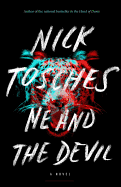
| Publisher: | Little, Brown | |
| Genre: | Fiction, Literary | |
| ISBN: | 9780316120975 | |
| Pub Date: | December 2012 | |
| Price: | $26.99 |
| Fiction |
by Nick Tosches
Is Nick, the narrator of Me and the Devil, really Nick Tosches? There are resemblances: Nick's an aging writer who lives in lower Manhattan and is familiar with the same cultural undercurrents as Tosches, an acclaimed musical historian and novelist (In the Hand of Dante).
It starts when Nick picks up a woman in a bar. As they have sex, he bites her thigh and swallows a few drops of her blood. "It was as if I suckled on her very soul and the inmost mystery of her," he reports, and that experience, as well as the physical rejuvenation that follows, sets him off in pursuit of more young flesh. He gets involved with a college student named Melissa, though Nick realizes that their relationship won't work if he drains her completely, so he needs to find other victims.
Keith Richards (yep, Keith Richards) recognizes Nick's vampiric tendencies and warns him to stop while he still can: "From what I saw, kicking it makes kicking smack look like a frolic in the daisies." In addition, an eerie manuscript turns up, in Nick's own hand--yet he remembers nothing of writing it.
Just when you think you know where things are headed, though, Tosches abruptly changes gears. It's not just a plot twist, but an entire reframing--one that will likely frustrate some readers, but ultimately strikes closer at the novel's deepest psychological themes. Me and the Devil is a profoundly disturbing novel, even more so for refusing to disturb readers in the most obvious fashions. --Ron Hogan, founder of Beatrice.com
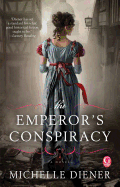
| Publisher: | Gallery | |
| Genre: | General, Fiction, Romance, Historical - General, Historical | |
| ISBN: | 9781451684438 | |
| Pub Date: | November 2012 | |
| Price: | $15 |
| Fiction |
by Michelle Diener
Charlotte Raven leads the life of a lady but, unlike her peers, she was not born into the upper classes--the orphaned daughter of a London prostitute and unknown father spent her youth as a chimney sweep before being taken in as a ward of Lady Catherine Howe. When characters from her past start to pop up at the balls and parties of the well-to-do, she quickly finds herself drawn into a political plot she could not have foreseen but now cannot escape, the epicenter of a collision of the rich and the poor in 19th-century London.
The Emperor's Conspiracy is based on an actual plot to undermine England's economy by smuggling gold out of the country, though Michelle Diener (In a Treacherous Court) has embellished on the original story to add levels of intrigue and romance. Diener's imagination results in a story of murder and mystery, smugglers and thieves, all underpinned by a simple romance. Though some of the characters in The Emperor's Court are conspicuously one-dimensional, particularly when it comes to the "bad guys," the novel's protagonist, Miss Raven, proves subtle and complex. Her struggle to find a balance between her past and her future, forced to decide to whom she will give her alliance--and her heart--proves the most interesting plotline, and one that will leave readers of historical romance looking for more from Diener. --Kerry McHugh, blogger at Entomology of a Bookworm
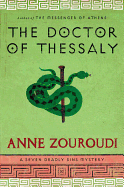
| Publisher: | Reagan Arthur | |
| Genre: | General, Fiction, Mystery & Detective | |
| ISBN: | 9780316217873 | |
| Pub Date: | December 2012 | |
| Price: | $24.99 |
| Fiction |
by Anne Zouroudi
The mysterious (and fat) Hermes Diaktoros is back in Anne Zouroudi's third book in the series organized around the seven deadly sins. The Doctor of Thessaly tackles envy; it begins with a bride left at the altar when someone throws acid in the face of her fiancé, blinding him. Hermes, who works for a "higher authority" than the police, is immediately on the scene, but the fiancé curiously doesn't want an investigation. That doesn't keep Hermes from looking into the crime, which leads to a shocking discovery.
Part of the pleasure of these books is the atmosphere, as Zouroudi takes her time transplanting her readers to fictional Greek villages. The Doctor of Thessaly tale unfolds in Morfi, and it's a pleasure to follow Hermes as he travels through town, getting to know its residents, and enjoying--or not--the local cuisine. One can almost taste the wine made from a lazy man's overripe grapes and feel the dirt on one's feet--though, as usual, Hermes keeps his tennis shoes pristinely white; he even does a bit of running in them.
This is the first entry in the series that drops a strong hint about who Hermes is and where he comes from: an old villager confronts our fat protagonist with "evidence." The Doctor of Thessaly continues the mythological arc of the series, while whisking readers away to a place where life has a gentler pace and tempo, but people are still capable of committing vicious acts toward each other. --Elyse Dinh-McCrillis, freelance writer/editor, blogging at Pop Culture Nerd
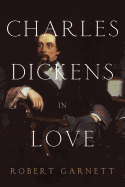
| Publisher: | Pegasus | |
| Genre: | General, Cultural Heritage, Biography & Autobiography, Women, Historical, Literary | |
| ISBN: | 9781605983950 | |
| Pub Date: | December 2012 | |
| Price: | $29.95 |
| Biography & Memoir |
by Robert Garnett
In Robert Garnett's in-depth Charles Dickens in Love, there are very few pages about the great writer's wife of 22 years, Catherine. He sent her packing in 1858 with one child, Charles Jr. (though she bore him 10), and any thought of a divorce was unthinkable. Catherine never saw him again; Garnett quotes a friend of hers as saying: "That man is a brute."
Dickens didn't love Catherine; he married her for companionship. He really loved Maria Beadnell, whom he met in 1830 when he was just 18--energetic, ambitious and poor, like young Ebenezer Scrooge. (She's Dora in David Copperfield.) Her parents quickly put an end to it; Dickens was heartbroken. She "seized his imagination early," Garnett writes, "and for years no other woman loosened her grip."
Then Mary Hogarth became part of his life. She was Catherine's 17-year-old sister who moved into the bustling Dickens household in 1837. Dickens was working on Oliver Twist at the time--she's Rose. That same year, she was stricken with an illness and died in Dickens's arms. He worshipped her memory for the rest of his life: "I solemnly believe that so perfect a creature never breathed."
His final love was the 18-year-old actress Ellen Ternan, whom he met in 1857 when she was acting in a Dickens play. She's the reason Catherine had to go, but their relationship had to be kept secret.
Garnett's well-told tale clearly shows how profoundly these women influenced Dickens's characters and inspired his writings. Losing Maria and Mary early on helped establish "his idea of the feminine." Women "became the soul of his novels," even if, as George Orwell caustically put it, these saints of his religion were really "legless angels." --Tom Lavoie, former publisher
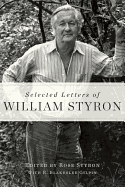
| Publisher: | Random House | |
| Genre: | Literary Criticism, Letters, Literary Collections, Books & Reading, Biography & Autobiography, Literary | |
| ISBN: | 9781400068067 | |
| Pub Date: | December 2012 | |
| Price: | $40 |
| Biography & Memoir |
by William Styron
In this masterful collection of William Styron's correspondence edited by his widow, Rose, with the literary scholar R. Blakeslee Gilpin, Styron often discusses how he has to force himself to undertake the "tedious and agonizing process" of writing, but write he did--and, boy, could he write letters: witty, sarcastic, bawdy, loving, long.
Many letters went to writer-friends--Philip Roth, James Jones, James Baldwin, Donald Harington, Peter Matthiessen--but most are to Pop, the father he deeply loved and whose opinion he cherished.
We see Styron as a young editor in New York City, living in a "gloomy dung-heap down in the village" and turning down manuscripts, including Kon-Tiki (he didn't think anyone would read it). Fired from that position, he tells Pop about starting his first novel, Lie Down in Darkness: "I hope when I'm finished with it people will read it." They did, of course, and the reviews were positive.
In 1952, he writes to Pop about a new novel he's undertaken: "The subject fascinates me." The Confessions of Nat Turner receives accolades, too, but also criticism from black writers; letters reveal how much that hurt the author. Subsequent letters chart the birth and growth of Sophie's Choice. Styron's later years were plagued with a suicidal depression that forced him "to the very edge of the abyss." To his surprise, Darkness Visible, his "slender little volume about lunacy," became one of his most popular books.
Selected Letters of William Styron reveals a hard worker, faithful friend and supporter of young writers. These beautifully edited letters will provide hours of laughter, surprise and learning. --Tom Lavoie, former publisher
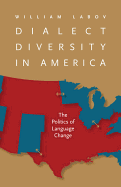
| Publisher: | University of Virginia Press | |
| Genre: | Sociology, General, Language Arts & Disciplines, Social Science | |
| ISBN: | 9780813933269 | |
| Pub Date: | December 2012 | |
| Price: | $30 |
| Social Science |
by William Labov
In Dialect Diversity in America, University of Pennsylvania linguistics professor William Labov details a transformation in vowel pronunciation in parts of the United States that he connects to the nation's pressing racial and political issues. He begins by debunking several popular language-related myths, including the idea that regional accents are fading due to mass media--in fact, Labov argues, differences in pronunciation across regional America are becoming more pronounced. Nowhere is this more obvious, he continues, than in the Northern Cities Shift (NCS), which has produced vowel pronunciations not heard in northern states as recently as 50 years ago. The NCS results in more tense, nasal vowels, particularly short-a sounds: those who speak with the NCS, for example, pronounce the name "Ann" so that it sounds almost identical to the name "Ian."
Labov also explores the political powderkeg that is African-American Vernacular English (AAVE), especially when it comes to using AAVE to teach reading in public schools. And he links NCS and AAVE together in a political analysis of northern states that reveals a fascinating correlation: those states in the forefront of the NCS are also those in the historical forefront of American political issues, ranging from the abolition of slavery to the abolition of the death penalty.
Dialect Diversity in America is written with non-linguists in mind, and Labov's arguments are easy to follow with or without crunching the statistical data he provides. It's an interesting introduction to linguistics as it poses the intriguing question of whether (or how) the sounds we make follow the political changes we embrace. --Dani Alexis Ryskamp, blogger at The Book Cricket

| Publisher: | McSweeney's Books | |
| Genre: | General, American, Poetry | |
| ISBN: | 9781938073021 | |
| Pub Date: | December 2012 | |
| Price: | $20 |
| Starred | Poetry |
by Zubair Ahmed
Zubair Ahmed was a 17-year-old professional video gamer in Bangladesh when his family moved to Texas in 2005. His improbable journey continued at Stanford, where he studied mechanical engineering and worked on the university's famous solar car team. All the while, he wrote poems that revisited the monsoon-drowned streets of his home city and his family's experiences during the liberation of Bangladesh from Pakistan in 1971. Ahmed's first poetry collection, City of Rivers, reveals a fresh young voice torn between the rain-soaked streets of Dhaka and the flash-flooded Texas of Joe Pool Lake, where, he observes:
"In nights of rain
The lake begs for more water.
I wish the lake knew
It was man-made."
The juxtaposition of densely urban Dhaka and the wide open, car-centric landscape of modern America runs throughout this fine collection, as Ahmed searches for the links in his itinerant life. One pillar supporting his search is his brother, who, he notes:
"became a mountain, always closer
To the sky than me,
Always large in the distance
Growing larger as I grew nearer.
I am wearing his shirt--
It hangs loose."
Although there may be the gamin heart of a video gamer and techie in this young poet, there is also a wise observer of the world wherever he finds himself in it, even in the cold weather found in the poem "Second Home":
"It snowed four days ago.
I don't feel as cold
As I am supposed to.
I almost believe
I'm as strong as I need to be."
With such a startling first collection of poems, let's hope Ahmed is as strong as he needs to be in order to give us more. --Bruce Jacobs, founding partner, Watermark Books & Cafe, Wichita, Kan.

| Publisher: | Coffee House Press | |
| Genre: | General, American, Poetry | |
| ISBN: | 9781566893152 | |
| Pub Date: | October 2012 | |
| Price: | $16 |
| Poetry |
by Raymond McDaniel
Like Denise Duhamel's popular Barbie poems, Raymond McDaniel's Special Powers and Abilities is a clever paean to a pop-culture artifact--in this case, the comic book; in particular, the 30th-century Legion of Super-Heroes. An avid fan since childhood, McDaneil says he wants to treat them as if they were "true," to "restore them to some of the glorious strangeness they would possess were we to see them literally and anew."
For those not in the know, this group is indeed "legion," from the well-known (and, in this case, time-traveling) Superboy and Supergirl to the lesser-known Shadow Lass, Ferro Lad and Brainiac 5--among nearly 40 comrades. The first poem invites with "Welcome, Visitors":
"Is this your first visit to the 30th century?...Look up, and see the sky teem with the teens of ten thousand suns.
A legion."
Next, McDaniel tells us "What to Expect" from these poems about the super-laden boys, girls, lads and lasses: "We will grow up. But we will never grow old."
Clearly, McDaniel is having lots of fun playing with different poetic forms and with the intricacies of seemingly unending permutations of "super" plots about super heroes, like infinite moves in a galactic chess game. There are entire poems about special issues ("Adventure Comics #313, October 1963") and sly, waggish, mischievous poems about his subjects' many super powers and super love lives. Might one expect a sequel to Special Powers and Abilities? To be continued.... --Tom Lavoie, former publisher
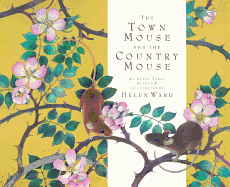
| Publisher: | Templar/Candlewick | |
| Genre: | Animals, General, Mice, Hamsters, Guinea Pigs, etc., Lifestyles, City & Town Life, Legends, Myths, & Fables, Juvenile Fiction, Country Life | |
| ISBN: | 9780763660987 | |
| Pub Date: | October 2012 | |
| Price: | $16.99 |
| Starred | Children's & Young Adult |
by Helen Ward
A city mouse plants a seed of doubt in the mind of his country mouse cousin in this sumptuously illustrated retelling of an Aesop fable.
Helen Ward (Pirateology; Unwitting Wisdom) distills the fable into spare poetic lines and allows her detailed watercolors to tell the real story. The slightly plump, wide-eyed country mouse basks in the riches of his quiet surroundings. Pink-tinted birds match the spring blossoms on a branch where the mouse peacefully perches, and in autumn, butterflies' wings echo the orange-tinted apples ripe on the trees. But the hero's cousin comes to visit, "a fine, sleek city mouse with a lot to say," and boasts of "exotic foods" and luxury where he lives. After the cousin departs, the country mouse sits alone in a field, and "grew less certain of his contentedness."
Ward shows the hero hitching a ride to the city on a truck transporting those orange-tinted apples: "He discovered lights in the dark and automatic ups and downs." Children will delight in sighting the little fellow through the gated door of an elevator. The city mouse's home may be filled with beauty and banquets (in a Christmas-tinged backdrop), but danger lurks in the form of human hands and frisky dogs. The country mouse "longed to be back beneath a night sky lit only by stars, to be safe, to be content... to be home." Ward's retelling and glorious full-page illustrations suggest that sometimes one must leave home to appreciate it fully. The underlying message is one of gratitude. --Jennifer M. Brown, children's editor, Shelf Awareness
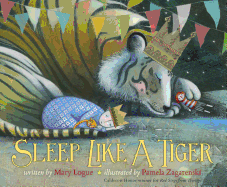
| Publisher: | Houghton Mifflin Harcourt | |
| Genre: | Daily Activities, Bedtime & Dreams, Concepts, Animals, General, Imagination & Play, Lions, Tigers, Leopards, etc., Health & Daily Living, Family, Juvenile Fiction, Parents | |
| ISBN: | 9780547641027 | |
| Pub Date: | October 2012 | |
| Price: | $16.99 |
| Children's & Young Adult |
by Mary Logue, illust. by Pamela Zagarenski
Caldecott Honor artist Pamela Zagarenski (Red Sings from Treetops) envisions a dreamlike world for debut author Mary Logue's imaginative twist on a bedtime tale.
"Once there was a little girl who didn't want to go to sleep even though the sun had gone away." Despite the familiar opening, children will detect this is no ordinary story. A girl in a crown clutching a stuffed tiger travels by skateboard under a full moon, while a tiger on wheels (also crowned) heads in the opposite direction carrying a giant orange (or is it a sun?) on its back. At home, though the girl says, "I'm not sleepy," her parents tell her to put on her pajamas and brush her teeth. "Does everything in the world go to sleep?" she wonders. Her parents offer examples--their dog, "curled up in a ball on the couch" and their cat "fast asleep... [in] the warmest spot in the house."
Round shapes and other visual motifs suggest movement even when the child is in bed, as if the gears of her brain are in motion. She asks about whales and snails, then cites a tiger in the jungle as "an animal that sleeps a lot." Zagarenski's lush accompanying image echoes Henri Rousseau's paintings in color and composition, and children will recognize the tiger and bright orange sun from the opening image.
Readers will feel they've been on a journey, as the lyrical text shows how the girl emulates the sleeping animals to find her own way into sleep. --Jennifer M. Brown, children's editor, Shelf Awareness